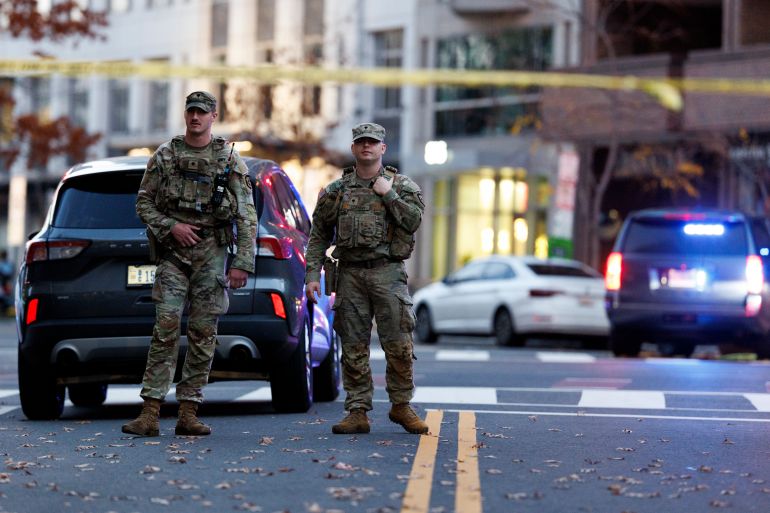Suspect in Washington, DC, shooting charged with murder after soldier dies
US Attorney Pirro files new charge against Rahmanullah Lakanwal after National Guard member Sarah Beckstrom succumbs to wounds.

Published On 28 Nov 202528 Nov 2025
Save
Washington, DC – A man who allegedly attacked two National Guard members in the United States capital has been charged with murder after one of his victims died from her wounds.
The updated charges were announced on Friday by Jeanine Pirro, the US attorney for Washington, DC.
Recommended Stories
list of 3 itemsend of list
They came two days after Rahmanullah Lakanwal, a 29-year-old Afghan national, shot West Virginia National Guard members Sarah Beckstrom, 20, and Andrew Wolfe, 24, just blocks from the White House.
Late Thursday, US President Donald Trump announced that Beckstrom, who had been deployed to the capital as part of what the president has framed as an anti-crime drive, had died of her wounds.
Pirro made the announcement on the Fox and Friends TV programme, a day after she said that Washington state resident Lakanwal would face three counts of assault with intent to kill while armed and three counts of possession of a firearm during a crime of violence.
Lakanwal “will now be charged with murder in the first degree”, she said on Friday.
“There are certainly many more charges to come, but we are upgrading the initial charges from assault to murder in the first degree.”
Attorney General Pam Bondi had previously said she would seek the death penalty if either of the soldiers died from the attack. The FBI has said it is investigating the attack as “terrorism”.
On Friday, National Guard member Wolfe remained in critical condition.
‘Collective punishment’
The upgraded charges come shortly after the Trump administration promised a widespread crackdown on immigration in the wake of the attack, as well as a revetting of immigrants already in the US.
Advertisement
Advocacy groups have decried the actions as “collective punishment”.
In a social media post on Thursday night, Trump said he would “permanently pause migration from all Third World Countries”, expanding a previous move to stop all immigration requests relating to Afghan nationals.
Trump further pledged to “remove anyone who is not a net asset to the United States, or is incapable of loving our Country”.
The administration had already said it would re-vet refugees and asylum seekers admitted into the US under former President Joe Biden, with the director of the US Citizenship and Immigration Services (USCIS) saying on Thursday that it would conduct a “full-scale, rigorous reexamination of every Green Card for every alien from every country of concern”.
The policy changes come as more details about the alleged attacker, Lakanwal, have emerged.
Trump administration officials have repeatedly blamed the shooting on lax vetting policies during Biden’s Operation Afghans Welcome, in which tens of thousands of Afghans were relocated to the US following the withdrawal of Western forces from the country.
US media has reported that Lakanwal was a member of an Afghan force that worked alongside the Central Intelligence Agency (CIA) in Afghanistan, dubbed the “zero unit”.
A friend told The New York Times that Lakanwal had suffered mental health issues related to the unit’s conduct, which Human Rights Watch has said included extrajudicial and civilian killings, among other abuses.
A government report viewed by the Reuters news agency showed that Lakanawal had applied for asylum in December 2024.
However, the case was approved in April, months after Trump took office for a second term, with officials noting his work alongside the US in Afghanistan. They found no disqualifying information at the time.
Advocates have said the Trump administration is using the attack to further supercharge a crackdown on immigration.
That crackdown, critics say, has targeted legal immigrants and vulnerable populations, including refugees who have sought sanctuary from persecution.
Responding to the ban on Afghan immigration processing on Thursday, the San Francisco Bay Area chapter of the Council on American-Islamic Relations (CAIR) said “collective punishment is never justified”.
“People fleeing violence, persecution, and instability deserve protection and due process — not to be vilified for the alleged acts of one person,” the group said.
The Afghan-American Foundation called on elected leaders and media to respond responsibly.
Advertisement
“Follow the facts, resist fear, and ensure that this tragedy is not used to divide communities or break apart the ties that bind us,” it said in a statement.
